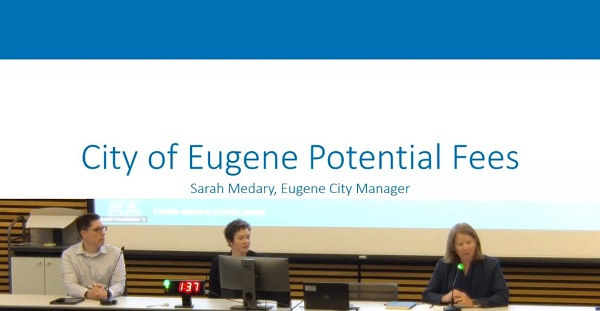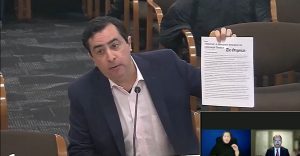City looks to EWEB for help with new fees
7 min read
The city of Eugene is considering new fees for parks and fire services, and would like EWEB to handle the billing. At the EWEB board meeting June 4:
Sarah Medary (Eugene, city manager): I’m Sarah Medary, city manager. Most of you know about some of the financial challenges that the city’s been working through. As part of this biennial budget that was adopted last year, we included over $20 million worth of ongoing reductions or reductions and even with that, we still had an $8 million revenue plug that needed to be filled in the biennium…
[00:00:31] As you likely know, it’s not that easy to generate $8 million of revenue in a single year. So, the supplemental budget that Council will have a public hearing about and take action on June 24 includes a mix of things to hit that $8 million. Most of it is reductions, probably $6.5 million worth of either one- time savings or ongoing savings…
[00:00:55] So as part of that, we’ve been exploring new revenues. I invited a revenue team, so a group of community members to include Commissioner Barofsky, to help us really learn a little bit deeper about what’s going on with the city’s budget, how we got here, and to evaluate a number of revenue sources that a staff team put together over the summer.
[00:01:17] One new revenue source is $1 million that we’re proposing in an increase in stormwater fees. So that would land on the bill and for an average home, probably 80 cents to $1 a month.
[00:01:30] The larger of the new revenue sources is consideration of a new fee for fire service and fire stabilization. We’re looking at approximately a $10 million proposal that would allow us to stabilize that service, stabilize the general fund, and also have some increases in some of the services we provide to the community.
[00:01:52] So anytime we start talking about fees, the first question usually that comes up is: Is EWEB going to bill for that? And the reason why I think people bring that up locally is because almost every other city in Oregon that has any other fees for parks, fire, and police, which is many cities, also do their own utilities and bill through their utility system.
[00:02:13] We’re pretty unique in that we’re separated. And so that’s, I think that’s why the question comes up and it’s why we tend to look, because we already have that relationship. Because I know there’s going to be a lot of conversation in the community, I wanted the opportunity to be able to come and talk to you, let you know, that the stormwater piece is sooner. Should have a pretty minor impact operationally on EWEB staff. The public hearing for that is on June 10 and potential action on the 24th of June.
[00:02:40] And again, the fire (fee), we’re going to work on through the summer and probably bring a proposal to the council in the fall. So we wanted to just give you a chance to talk and ask questions and if you would like a deeper presentation and more information, we’re happy to come back at any time.
[00:02:57] John Brown (EWEB commissioner): Now it’s $8 million, but it’s $13 (million) next year, and you already have baked into your five-year CIP (Capital Improvement Program) five point some-odd percent per year compounded on stormwater. I’ve looked at the budget.
And my concern is that it’s an EWEB bill, and two of the four charges on EWEB bills have nothing to do with EWEB, but it’s always tagged on to EWEB. And I have a real problem telling a single mother with two kids: ‘We’re going to shut your power and water off because you can’t pay this bill.’ And this is death by a thousand cuts to me.
[00:03:25] I would be totally for doing a separate billing, I would absolutely help champion that, but to separate water and electricity, which we have input on and control on and then separate the other two, stormwater and MWMC (Metropolitan Wastewater Management Commission), I’m good with that.
[00:03:41] And then if you want to add a fire fee, and then we don’t have to worry about the charter and everything else, I would support that, but I would have a real problem with shutting people’s power off because they can’t pay this bill that now has fire and parks operations in it.
[00:03:55] And so that’s kind of my high-level response and you can talk me out of it, but right now I would be challenged to want to approve a fire fee.
[00:04:05] Sarah Medary (Eugene, city manager): Yeah, I’m not interested in talking you out of it. We share some of your concerns and that’s why I’ve said we’re pretty open to exploring what is the best way to do this that works for all.
[00:04:15] John Brown (EWEB commissioner): Yeah, and also I look at, you know, like 4J, they’re tax-exempt, but they say they pay more in stormwater fees than they do in electricity. And you look at the tax-exempt entities, now we’re going to bill them for a fire fee, which are they really obligated to pay it or not? And I look at the rental community, they’re already paying for parks in their rent through their property taxes and their fire. And so it’s to me, it’s double dip.
[00:04:38] So there’s, yeah, I wouldn’t want to be in your shoes and trying to figure this out. But I can see where there can be some pushback on it. But I also understand your need for the money, and you’ve done some pretty brutal cuts already. So I thank you and I’ll support you if I can in something that would not adversely impact our ratepayers.
[00:04:58] Sonya Carlson (EWEB commissioner): I agree on the not-turning-power-off piece. I have a disagree and would not like to do separate billing if at all possible. I know that that’s controversial, but I think since we did a lot of work around updating our bill and what the bill itself looks like, it’s, I haven’t had very many constituents come to me with, like, they understand where that’s coming from.
[00:05:21] So they have questions about it. They think more goes to the city because it’s spelled out a little bit better. But I don’t want us to just for inconvenience sake or how-it-looks sake have an additional cost, because it would be a whole different system that would have to be paid for and that would be a bigger burden, and thus we would get you know lower impact on the amount of money spent.
So as much as I don’t want to put another thing on our bill, if that has to be done, I would rather that we do it so we get more of our community dollars where they need to go to support the other programs.
[00:06:01] John Barofsky (EWEB commissioner): Like Sarah said, I sat on the Revenue Committee. We flushed through a lot of things and I did bring up a lot of the concerns that I’ve heard at this board and in this boardroom as far as the challenges that some of our customers have with our billing. And so just know that that was voiced in the room and it was heard very well by staff.
[00:06:25] One of the questions that I would have on the stormwater fees. You mentioned the impact to a single-family home. I’m wondering if you could also give us what it’s going to do to the business community, to some of the larger stormwater, ratepayers, as Commissioner Brown alluded to: 4J, Valley River Inn, some of these large commercial and even small commercial, you know, what the average impact is going to be on those. Because it’s easy to say, ‘Oh, this is going to be 40 cents on the average homeowner. But, you know, if you’ve got a lot of impervious surfaces, it’s exponentially larger. So that would be something that would be helpful for me so that I could explain it to my constituents.
[00:07:08] When we’re talking about billing for a fee, it was brought up by me and by other people in the Revenue Committee and at City Council, that there would have to be some sort of fee assistance for low-income people that would be baked into that. I think that was one of the things that we stressed as well.
[00:07:27] John Brown (EWEB commissioner): So let’s just take the University of Oregon, for example. They don’t pay a penny for fire protection right now. And now they’re going to start paying into our fire department for the protection that they get?
[00:07:39] Sarah Medary: Yeah, again, this is determining how it gets billed and who’s the owner, but we anticipate that University of Oregon would pay the fee.
[00:07:50] John Barofsky (EWEB commissioner): And this is a model that is being used by several other communities throughout the state. It’s not like we’re inventing it.
[00:08:00] Matt Rodrigues (Eugene Public Works director): Medford, Corvallis, Grants Pass is considering it, they haven’t put it in place; Jacksonville, (Salem), there’s three or four more that have a fee that includes fire service in it.
[00:08:14] And in Corvallis, just kind of responding to your question about U of O, that OSU does pay that fee to Corvallis. as an example.
[00:08:25] Mindy Schlossberg (EWEB commissioner): I know we just went through a whole bill redesign, but if we did start adding significant fees, I think that we would need to add something to the bill to make it clear, even the return address maybe wouldn’t just be EWEB, but EWEB and the city of Eugene or something like that.
[00:08:41] John Q: The city brings its $28 million dollar gap down to about $8 million, with plans for $6.5 million in cuts, and new fees on the way for parks and fire services. The city will likely have EWEB bill for the new fees.






